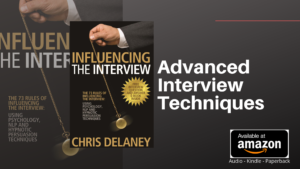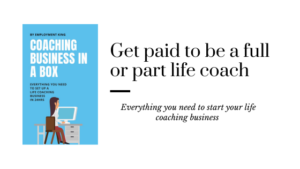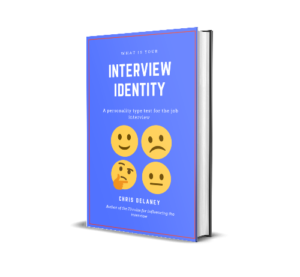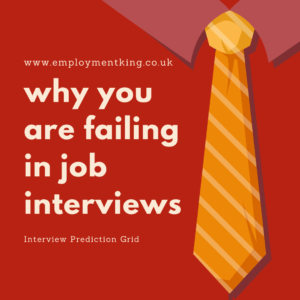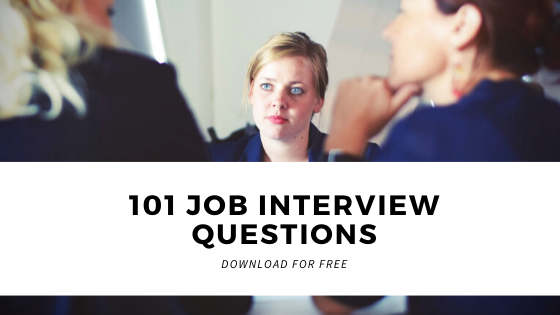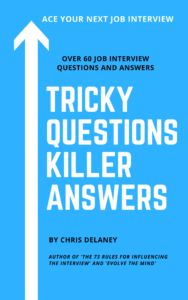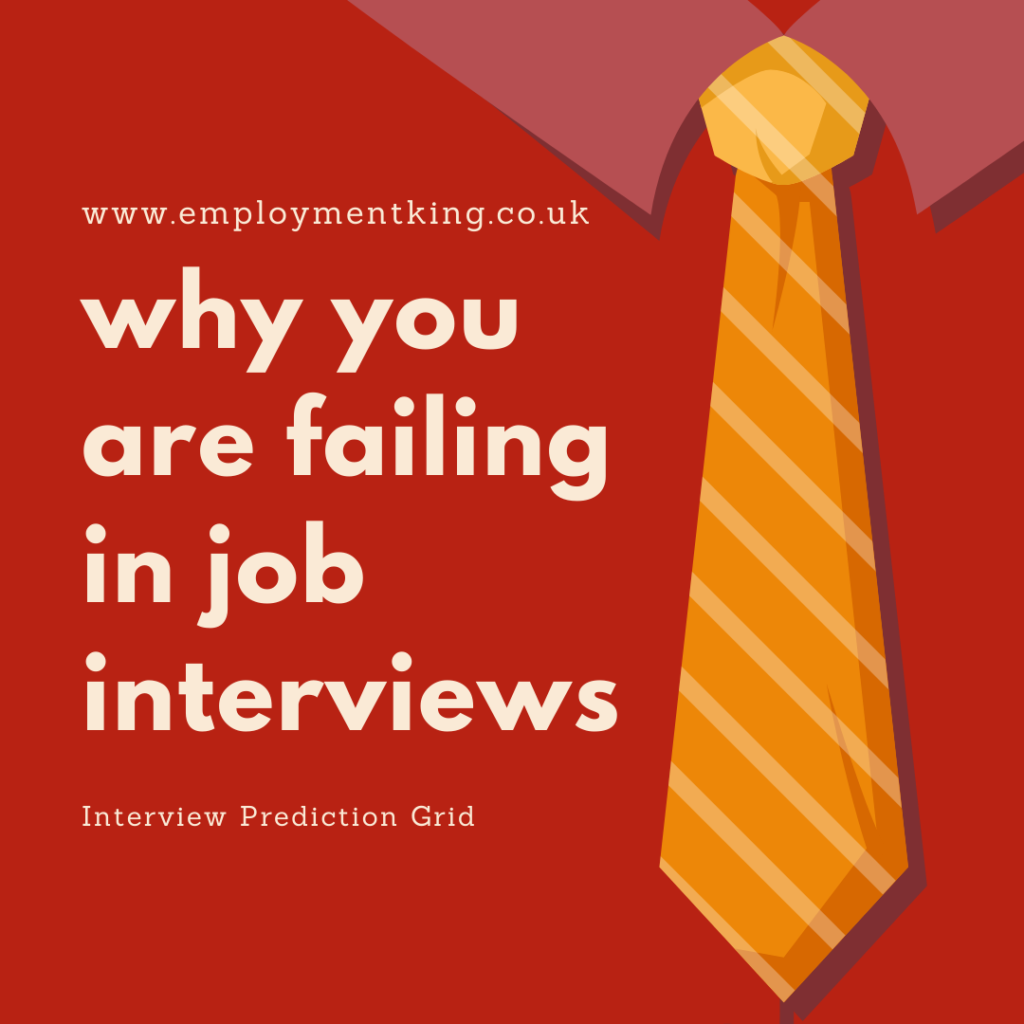Why do experienced applicants fail job interviews?
Often it is because they don’t understand what type of answer (or information) the employer requires from their pre-planned interview question.
During a 45-minute job interview, the interviewer will ask around 10 job interview questions. Each question has been chosen to uncover if you meet a specific criteria on the job spec.
The problem here is that most interviewees don’t really ask themselves “why is the employer asking this question?” “what skill or experience is the employer trying to uncover by asking this particular interview question?”
Instead most applicants will simply answer a question relating to past success they feel is important.
This is like giving someone who wanted a banana an apple, they are both fruit but its not what they really wanted. To be successful in the job interview you first need to figure out why the employer is asking this question, from this perceptive you can then deliver a powerful answer proving that you exceed the job specification.
Below is a list of common asked interview questions, the reason behind the question and to make things really simple an example answer. Remember the key to winning a job offer during the job interview is preparation.
Tell me about yourself?
One of the most common asked questions in interviews, normally asked at the beginning of an interview, this question gives you the opportunity to deliver a short statement about your experiences and skills relevant to the job position you are applying for.
- Start with a “selling” line that will highlight your main strength and/or achievement
- Keep each point brief as you can explain each point again in more detail throughout the interview
- You want to interest the interviewer and get them to want to know more about you
- End this answer with a reason why you’re looking for a new job
“I’ve been working in Sales for 8 years. I have a great understanding of selling insurance to the public and businesses. My innovative sale techniques have increased profits by 25% year on year for the past 3 years. I am now ready for a new challenge and with your company having a great reputation, I believe this is the opportunity I have been waiting to apply for”
Why did you leave your last job?
Be positive with this answer and smile – employers like to hear that you left for a good opportunity or reason, a chance to do something special or for a good career move.
- Start the answer with a look back
- Explain what you enjoyed about your previous role
- Give a Positive reason for leaving
“I enjoyed working at Company Name and really enjoyed the interaction of working with a wide range of individuals-I feel I gained a lot of transferrable skills from this experience, which I can use in this role. It was a hard choice to leave but I felt that this great opportunity is the next obvious step for me”
What experience do you have in this field?
For this question you first need to read and understand the job specification, as this will tell you what experience the interviewer is looking for. Your answer should relate your experience and achievements to that of the job role. Often interviewees will talk about experiences that are not relevant to the job role, this will only lead to the employer becoming uninterested in you.
“I have over 6 years experience as a nursery nurse, in that time I have gain an NVQ Level 2 and 3 in child care. I have worked with children of all ages including groups of children with disabilities. I understand the importance of “health and safety” and “every child matters” and use my creative skills to organise games and activities to teach young children new skills while keeping them entertained. Recently I also won an award for employee of the year”
Do you consider yourself a successful person?
Yes, is the answer you should always give and then follow this up with the reason why. Explain when you have achieved something you felt was “big” or goals you have set, completed or currently moving towards.
“Yes, I would say I am successful. Once I am given a task to do, I always put a hundred percent into achieving it. Soon after giving birth to my baby boy, I attend an AAT night course and had to study while bringing up my son. This was a large amount of work, but as I am good at managing my time, I was able to pass my course with flying colours.”
How would your colleagues describe you?
Interviewers enjoy hearing quotes, have a couple of quotes prepared from people at your previous job “David always said I was….” and use statements like: “In my last job I was always known for…”
By giving quotes from a named person can be as effective as giving the interviewer a written reference.
“In my last company I was always known as the person who got things done. I remember overhearing my Manager Sharon, saying ‘if you need a job doing quickly and efficiently to get me to do it”
Are you applying for any other jobs?
Of course you are, every interviewer knows you are looking for work and it’s highly unlikely that you only have one interview lined up. Explain why you are looking for other work and follow this up by telling the interviewer how much you want to work for their company. Employers like to offer jobs to people who will accept them and/or not leave after a couple of weeks for a better job offer. Why? Recruitment can cost companies around 33% of their profits!
“Yes, I am looking at other jobs in this industry as I know this is the type of work I will excel in. I have researched your company and feel this is the type of company I would really fit into”
Are you willing to put the interest of the organisation ahead of yours?
This is a test of employment loyalty; the interviewer is looking for someone to put there all into the company, employers may want you to come into work at a drop of a hat. If asked this question, answer using a confident voice.
“Yes, I want to put my all into this job and organisation”
Describe yourself as a person?
This is a great question to be asked, as it is open for you to really sell your skills and qualities. When answering this question, talk about the skills, qualities and experiences the company require (taken from the job specification) and answer the question by telling the interviewer how you have these required skills. Use real-life stories and examples to highlight your strengths.
“I am a keen and driven person; once I start a task I always put a hundred percent into completing it. I have often been told I am approachable and a good listener who completes goals quickly and efficiently”
Do you have a work philosophy?
Don’t be tempted to give a deep long answer here, keep it short, sweet and positive;
“I would say my work philosophy is; getting the job done to a good standard”
Aren’t you over qualified for this role?
Employers are always worried that an employee who is over qualified for a position, will take the job once offered and leave when offered a better paid position relevant to their qualifications.
Answer by stating how much you enjoy this type of work and how this is career move, not just a job. It is also good to highlight that you would pick this job over one relevant with your qualifications. Never say you’re looking for work with less responsibility or stress – keep the answer positive.
“For me, this is a career move not just a job. I am really interested in this industry and would choose this role over one with higher pay, relevant to my passed qualifications”
What are your strengths?
This is one of the most common questions you will be asked. Give an answer relevant to the skills and qualities relevant to the position you are applying to. The interviewer is trying to find if your strengths match the job.
For example, if you are applying for a job where accuracy is an important issue, one of your strengths could be that you have an eye for detail. It may useful to find different words to describe similar attributes and qualities in order to avoid repetition.
“I have often been told that I have an eye for detail and that I am very accurate and precise. This was very important during my last role where I worked on large business accounts”
What are your weaknesses?
Again, another commonly asked question. A frequent mistake to make when answering this question is to say something negative like “I can sometimes let things get on top of me”. Be positive and sell yourself with every interview question, turn a negative into a positive. For example,
“In the past I felt I needed to improve my typing skills, because I aspire to be the best I can, I have recently enrolled on a typing course”.
This will show that you can identify your weaknesses but at the same time, you are willing to improve. Most importantly: do not mention a weakness that is any way related to the job you are being interviewed for! This might sound obvious but it is a common mistake!
Do you have a dream job?
Rather than mention a job, talk about duties and skills you like, to impress the interviewer theses have to be relevant to the job they are offering. Also state how your dream job would be somewhere where the team all got on, where you love the work, where you can contribute to the work.
“I have always wanted to work within an organisation with a reputation for excellence, like this one. My dream job has always been a role where I can solve business problems and make a difference with other organisations. What is really important to me, is to work within a good team in a company that is moving forward”
Have you ever had to fire anyone?
Don’t worry this is only asked for management positions; Firing someone is always serious, when ask this question you need to answer seriously.
The employer here is looking if you quickly fire people or support and develop your staff/team.
If you have never fired an employee you should answer this question in a future presence.
- The key here is to say how you new your member of staff did not have capability to complete the role
- Explain what steps you took to try and improve the employees skills/job duties
- And how finally after giving the employee every opportunity to progress you had to let them go
“In my last management role, one of my team wasn’t meeting her targets. Through appraisals we found her strengths and areas of development and from this wrote out an action plan for us both to follow, including putting the member of staff through some needed training.
Over several months we monitored her work and any improvements and continue to have regular meetings with the staff member.
After several months we didn’t notice any significant improvements and from this started the grievance procedures, while continuing to monitor the staff member’s performance and following the action plans. In the end we felt we had done all we could to support the member of staff and in the end had to let her go. The member of staff actually agreed this was the best choice and thank us for all the support over the last several months”
Have you ever been asked to leave a position?
Be truthful, employers will find out when they ask for a reference. If you have give a brief answer and stay away from giving any negatives about the company you worked for. If the answer is no, Say “No, never”
“Once, several years ago, once I had left university I had a part-time job, the role didn’t suit me as I enjoy being kept busy. I think the manager knew I was going to be moving on”
Why Should We Hire You?
A great question for selling yourself, if you have already talked about your skills and qualities, give a brief answer around your relevant experience-keep this general, as an example add up the amount of years experience you have rather than giving individual dates.
This answer should highlight the benefits you will bring to the organisation. Think-what makes me stick out from the other candidates?
“I have over 8 years experience in this industry and I have always achieved my target, by hiring me you will get both my experience and my large client base. In my current role, I have achieved year on year profits since starting their 3 years ago”

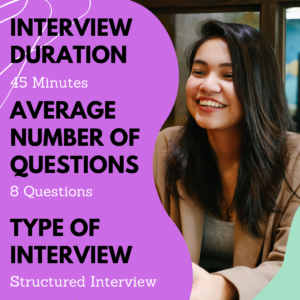
 Interview Questions
Interview Questions 




